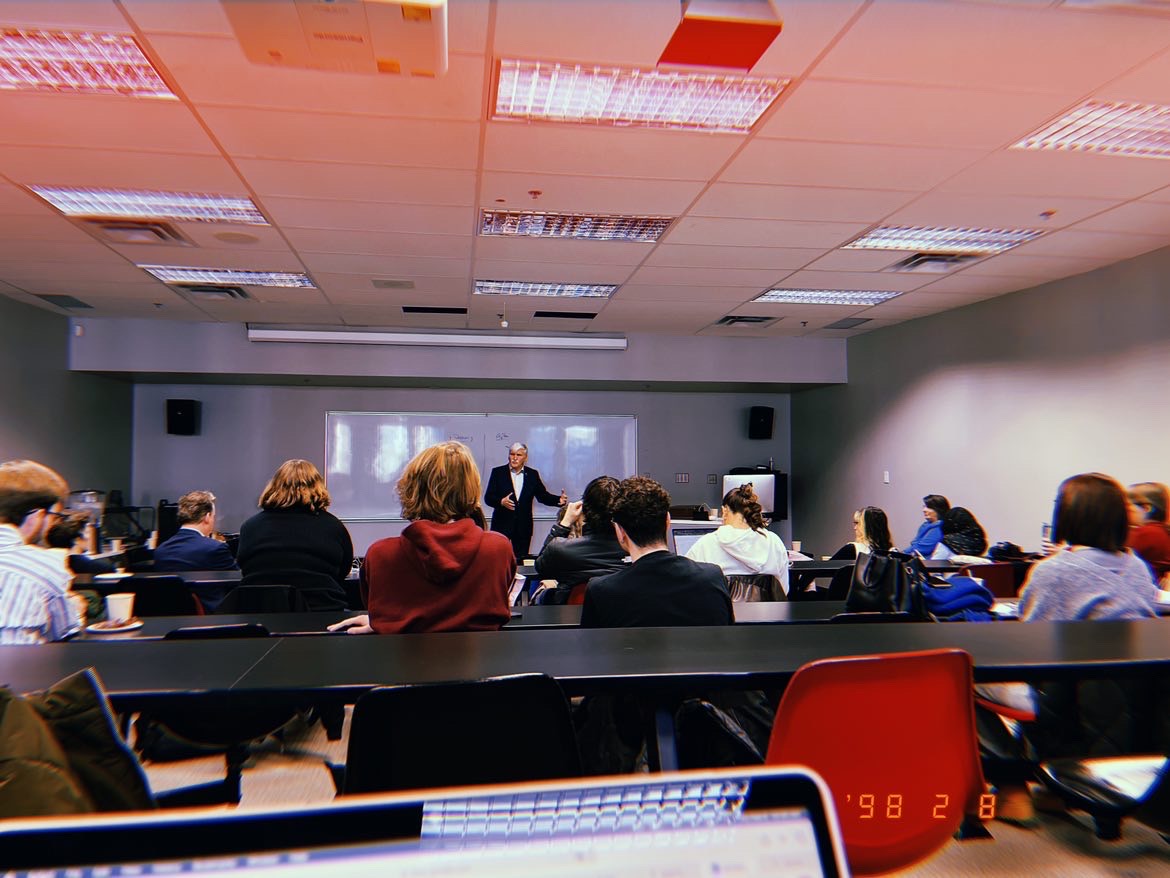General Roméo Dallaire explored the importance of contextualizing conflicts from their prelude to their aftermath.
On Feb. 8, retired Lieutenant General Roméo Dallaire gave a talk at the Loyola Campus about the role of journalism in relation to complex conflicts. Dallaire is a former Canadian Senator as well as a former government and United Nations advisor. He served as a force commander of the United Nations assistance mission in Rwanda and witnessed the 1994 genocide first-hand.
Walking into the room with his brown briefcase in hand, Dallaire made his way to the whiteboard to map out the three parts of any given conflict: the “pre,” the “during,” and the “after.” He said the “after” category has demonstrated to be one of the most temporary periods of the whole process: “We’ve never, ever, achieved peace.”
“The best we’ve done is establish truces. Over the last 20 years, of the nearly 15 truces and agreements that are happening in the world, the longest one lasted seven years,” Dallaire said. He added that since solutions in the “after” stage are so temporary, conflicts often go right back to the “pre,” and there is never any lasting peace.
The general also spoke about his time in Rwanda in the 90s. During the genocide, over 800,000 people died (excluding all the untold deaths in refugee camps), over 500,000 were orphaned, and four million people were displaced or became refugees. This all occurred over the span of only 100 days, and tensions between the two ethnic groups, the Tutsis and the Hutus, remain today.
“This is a crisis. So where do you fit? Where does journalism fit?” Dallaire asked. He explained that more often than not, journalists and the media decide to start their reporting amid the “during” stage of a conflict. If the “pre” stage of a conflict was reported on, a deeper understanding of the existing frictions and build up could be understood.
Dallaire also spoke about how he treated journalists not as the enemy in Rwanda, but as individuals with whom he could exchange information and have an open dialogue. This allowed for optimal broadcasting. “The media ultimately ended up, during this period, as the only weapon I had as a peacekeeper,” Dallaire said. He noted, however, that little to no journalists were there from the beginning to understand the “fundamental premises and debate behind why this [conflict] has blown up.”
Dallaire emphasized the importance of separating reporting from sensationalism to the room filled with future journalists. Situating a conflict and presenting it to the audience as a culmination of social elements rather than a spontaneous explosion or a re-assault of frictions is key. Dallaire also discussed the reality of the business side of journalism and how certain stories end up on editors’ chopping blocks.
After a question about seeing children growing up in war-torn countries and generational wars, a point the general had brought up during his presentation, Dallaire said that love had a big part to play as to why he didn’t take his own life after everything he’s lived through. “True love, not convenience—not temporary like our truces,” Dallaire joked.
A student asked him how a journalist can recognize a crisis before it happens when reporting in a foreign country, and how to act accordingly. Dallaire said journalists should strive to remain cultured, open, curious, and want to know more about systemic frameworks. With those skills, one can then gather information on what is evolving in those countries in order to paint a picture of what is going on.
A student later asked Dallaire: “As somebody who has seen genocide with his own eyes, do you believe the war on Gaza is a genocide?” The general recalled that many major nations and the UN took six weeks to call the Rwanda conflict a genocide, subsequently sent the troops he’d been asking for. It was too late. “And what did [calling it a genocide] do? Absolutely nothing,” he said.
Dallaire said it is far more important to consider how nations are reacting instead of being hung over the word. “You can articulate the term ‘genocide,’ but it has no power, because the national bodies that are governing us are not using it, don’t want to use it, and don’t want to read the convention that says that they’re supposed to commit to that.”
Dallaire also believes it is essential to integrate the powers of both men and women to restructure the institutions that govern and have been built by men. “[If not] we will continue to respond to these very powerful male-dominated institutions, and women—too many women—simply adapt into it versus fighting it,” Dallaire added. “Let’s put an end to this male-dominated misogynist egocentric paternalistic masculinity that has created the state of humanity and bring the women in full force.”
His new book, The Peace, is set to come out this April, and argues that people are often still unable to acknowledge crises and make decisions that could prevent or resolve them before it’s too late.
